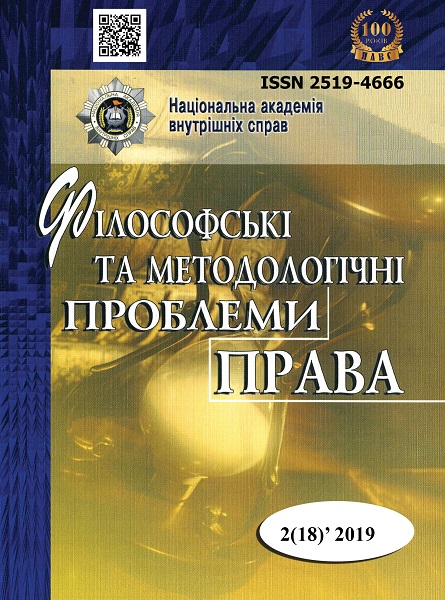Evidence Sufficiency Criteria
Abstract
The purpose of the article consists in a search of objective foundations, on the base of which would be able the formulation of some stricter, than an appeal to «inner conviction», criteria of the evidence sufficiency (on condition of preliminary establishment of their authenticity, properness and admission). Methodology. The method of comparative analysis is used for the exposure of sources of basic contradictions, traced in the most widespread methodological approaches to decision of the examined problem in modern literature. The methods of logical modeling, generalization and formalization were used during the analysis of logical semantic bases of concept «sufficient foundation» as an objective and universal criteria of evidential base evaluation. The scientific novelty of offered approach to decision of the investigated problem consists in that it allows to reveal the basic sources of contradictions in interpretations of the meaning and criteria of evidence sufficiency, and also to outline the ways and means of their solving both in a theoretical plane and in legal practice. It is proved, that the effective way to overcome such contradictions is the concordance of judicial criteria of evaluation of evidences with the logical conditions of their sufficiency. The logical semantic basis of such conditions is a requirement, according to which the set of possible situations, where all the evidence data are synchronically true, must not exceed the sphere of empirical confirmation of correspondent article of proving. The logical «indicator» of implementation of this term is an incompatibility of the system of evidence data with the supposition about the absence of situation, which is being proved. Conclusions. The logical criteria of evidence sufficiency enable not only to carry out a clear evaluation of the collected evidential base, but also they essentially promote the rationalization of its forming and guarantee the provability of judicial decisions (as a concept «sufficient foundation» cannot have some specifically legal meaning, different from its interpretation in logic).
Keywords: legal argumentation; judicial proving; proving methodology; logical criteria of argumentation provability; logical requirements to the evidential base; evidential sufficiency criteria; objectivization of proving procedures.
Downloads
References
Dagan H. The New Legal Realism and The Realist View of Law. Law & Social Inquiry. 2018. Vol. 43. Issue 02.
P. 528–553. doi: https://doi.org/10.1111/lsi.12319.
Dagan H. The Real Legacy of American Legal Realism. Oxford Journal of Legal Studies. 2018. Vol. 38. P. 123–146. doi: https://doi.org/10.2139/ssrn.3103299.
Дєєв М. В. Визначення достатності доказів як складова частина процесу оцінки доказів. Держава та регіони. 2015. № 4 (50). С. 65–74. (Серія «Право»).
Enoch D., Fisher T., Spectre L. Statistical evidence, sensitivity and the legal value of knowledge. Philosophy and Public Affairs. 2012. Vol. 40. No. 3. Р. 197–224.
Хмыров А. А. Косвенные доказательства в уголовных делах. СПб. : Юрид. центр Пресс, 2005. 250 с.
Курс цивільного процесу : підручник / [В. В. Комаров, В. А. Бігун, В. В. Баранкова та ін.] ; за ред. В. В. Комарова. Харків : Право, 2011. 1352 с.
Кононенко В. П. Доказування в міжнародному суді ООН. Правова держава. 2018. № 32. С. 176–182. doi: https://doi.org/10.18524/2411-2054.2018.32.149585.
Лисанюк Е. Н. Обоснование в праве с точки зрения логики. Миссия интеллектуала в современном обществе : сб. ст. СПб. : СПбГУ, 2008. С. 486–500.
McCann M. Preface to The New Legal Realism, Volumes I and II. Cambridge University Press, 2016. doi: https://doi.org/10.1017/CBO9781139683432.001.
Miles T. J., Sunstein C. R. The New Legal Realism. University of Chicago Law Review. 2008. Vol. 75. No. 2. P. 831–851.
Мірошниченко Т. М. Щодо питання правової регламентації оцінки доказів у кримінальному процесі. Перший Харківський кримінальний процесуальний полілог. 2016. № 1. С. 124–130.
Pardo M. S. The paradoxes of legal proof: A critical guide. Boston University Law Review. 2019. Vol. 99:233.
P. 233–290.
Roth A. Safety in numbers? Deciding when DNA alone is enough to convict. New York University Law Review. 2010. Vol. 85. P. 1130–1185.
Шаптала Н. Внутрішнє переконання під час оцінки доказів у конституційному судовому процесі. Науковий вісник Національної академії внутрішніх справ. 2019. № 1. С. 22–28. doi: https://doi.org/10.33270/01191101.22.
Щербина О. Ю. Логіка та юридична аргументація : монографія. Київ : ВПЦ Київ. ун-т, 2013. 303 с.
Шульгін С. Достатність доказів як підстава прийняття процесуальних рішень слідчим та прокурором. Право та державне управління. 2019. № 2 (35). Т. 2. С. 109–116. doi: https://doi.org/10.32840/pdu.2-2.16.
Smith M. When does evidence suffice for conviction? Mind. 2018. Vol. 127. Issue 508. P. 1193–1218.
Тягло А. В. О стандартах доказательства. Форум права. 2018. № 1. С. 88–94. doi: http://doi.org/10.5281/zenodo.1239007.
Зінченко В. М. Достатність доказів у ході закінчення досудового розслідування. Юридичний науковий електронний журнал. 2019. № 4. С. 237–240. doi: https://doi.org/10.32782/2524-0374/2019-4/63.
Abstract views: 674 PDF Downloads: 3249
Copyright (c) 2020 Philosophical and Methodological Problems of Law

This work is licensed under a Creative Commons Attribution-NonCommercial-NoDerivatives 4.0 International License.
- Authors reserve the right to authorship of their own work and transfer to the magazine the right of the first publication of this work under the terms of the Creative Commons Attribution License, which allows other persons to freely distribute published work with mandatory reference to authors of the original work and the first publication of an article in this magazine.
- Authors have the right to enter into separate additional agreements on non-exclusive dissemination of the work in the form in which it was published in the journal (for example, to post an article in the institution's repository or to publish as part of a monograph), provided that the link to the first publication of the work in this journal is maintained.
- The journal's policy allows and encourages the posting of articles by authors on the Internet (for example, in electronic storehouses of institutions or on personal websites), both before the submission of this manuscript to the editorial office and during its editorial processing, as this contributes to the creation of a productive scientific discussion and positively affects the efficiency and dynamics of citing the published work.




